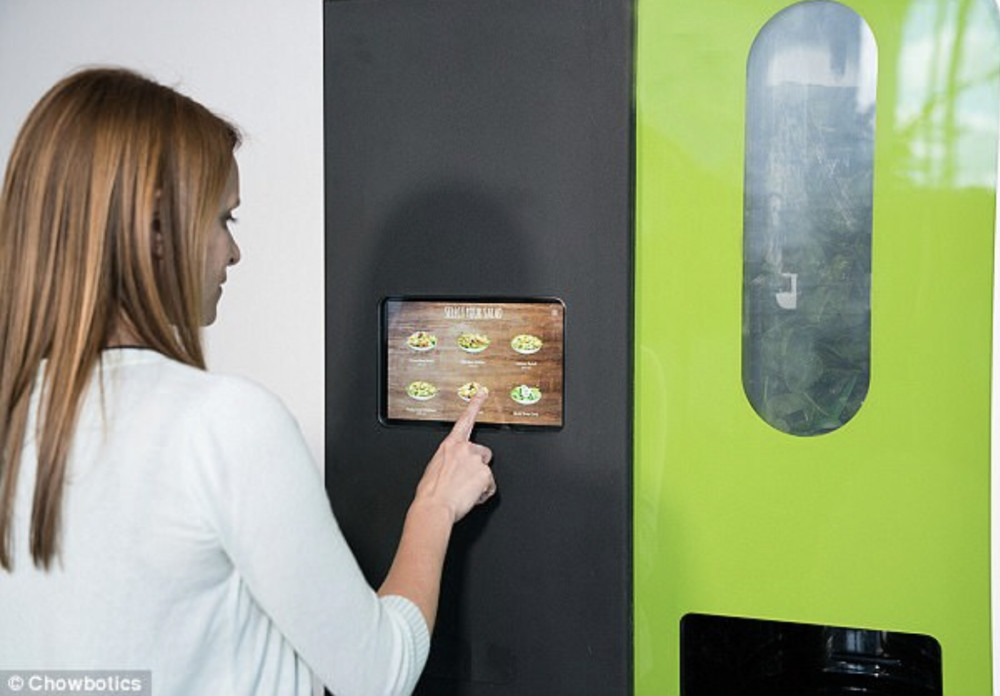By Leonardo Castañeda
The Mercury News
WWR Article Summary (tl;dr) When you need to grab a quick bite at the office you soon may be able to look beyond that Snickers bar in the vending machine. From robotic machines that make fresh salads to prepared foods from local restaurants, some companies are bending over backwards to keep lunchtime in house.
The Mercury News
The next frontier in automated food could be coming to an office kitchen near you, complete with big, salad-making robots.
Relying on AI to make on-demand lunches at work could provide employees with more healthy options while cutting down on the time they spend away from their desks searching for food, say two companies at the forefront of the work lunch frontier.
Byte Foods provides an automated, refrigerator-like store where employees can buy prepared meals from third party restaurants and food vendors.
Chowbotics offers a robotic chef-in-a-box that prepares salads on demand. Along with firms working on self-driving cars that can carry dozens of grocery bags to knee-high food bots that navigate sidewalks to deliver meals, the two Bay Area companies were on hand at ArticulAte, a food robotics summit in San Francisco hosted by Smart Kitchen Summit and The Spoon.
“It’s like a mini-Whole Foods for your office,” Lee Mokri, founder and VP of sales for Byte, said in an interview. “You’ll see Blue Bottle iced coffee in there, you’ll see Urban Remedy salads and wraps and Kombucha and parfaits.”
For those food companies, offices are a huge untapped market, Mokri said.
“You’ve got this captive group of customers. You know they’re going to be there every day. You know what they want to eat. You can market to them directly,” he said. “You are inserting your brand into their lives rather than asking them to take time out of their day to go to your store.”
Unlike a traditional vending machine where the vendor pays the office to set up their machine, companies ranging from Apple, Google and Amazon to smaller nonprofits and law firms pay Byte to install its fridges in their offices, Mokri said. Employees can then just swipe their credit cards and open the fridge door.
“You treat it like a normal retail experience where you can pick things up, you can put them back, take multiple things at the same time,” he said. When you close the door, the device figures out what you took and charges you for it.
If Byte is bringing a grocery store to the office kitchen, Chowbotics wants to bring a salad bar with a chef. Through Sally, their robotic chef-in-a-box, customers can order custom salads, prepared in the moment. Deepak Sekar, founder and CEO of the Redwood City-based Chowbotics, said salads are a healthy option for employees that also cut down on the time workers might spend going out.
Chowbotics doesn’t directly operate the roughly 50 machines it has in about 30 locations in the US and Europe.
Instead, Chowbotics sells the machine, which costs about $30,000, and the new owner maintains it and makes sure it’s stocked with ingredients, Sekar said.
“We want to create an Apple experience,” he said, where clients can take their Sally out of the box, plug it in and start selling salads without any training or help from Chowbotics. Speaking after his presentation, Sekar said the cost savings from automation allows Sally’s operators to sell salads for as little as $4 and still make a profit.
Byte doesn’t prepare any of the food it sells, but Mokri said they can use customer data to see what kinds of products make the most sense in each location. For example, he said, Tesla has Byte machines in its factory for manufacturing employees.
“They’re looking for high protein, affordable sandwiches and denser entrees,” Mokri said. “Whereas a small law firm or ad agency may be looking for salads and green drinks and that type of thing.”
The company can even see which products are about to expire and send targeted ads to customers it knows like those sandwiches or drinks. Mokri said San Rafael-based Byte now has more than 500 fridges in the Bay Area and though they get a fee from those locations, the primary revenue source is the products sold in the fridges.
Both Byte and Chowbotics also have devices outside of offices, in airports, hospitals and college campuses, places with captive audiences.
Although those locations tend to be secure, Sekar said there are challenges. In France, he said, students hacked one of the salad machines and used it to display adult images. At another company office, Chowbotics noticed the machine kept shutting off during the day.
“The employees had a habit of unplugging the machine from the socket,” he said. They were using the socket to plug in their laptops.
Sally was updated, he said, to make the robot harder to unplug.














































































































































































































































































































































































